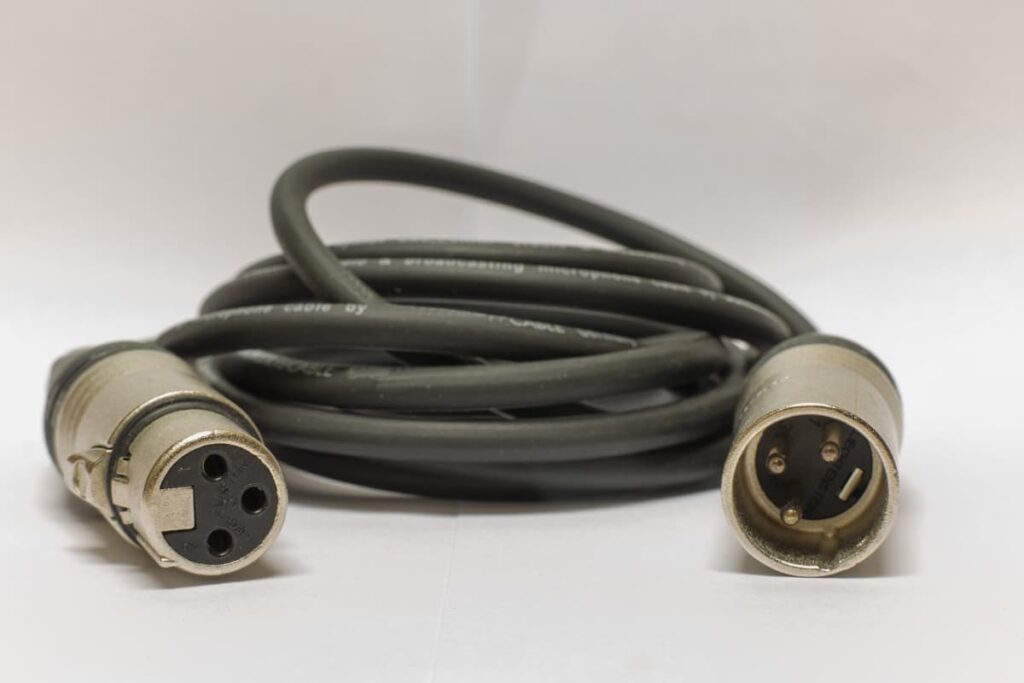We often have to work in less than ideal conditions in our home studios. This often leads us to make some compromises when setting up our gear and connecting it with cables—we have to wound them around furniture, keep them at weird angles, or use longer cables than necessary.
This can lead to a few minor issues, but you definitely wouldn’t want a long microphone cable to affect your sound quality.
Microphone cable length can affect sound quality. This is particularly true for long and unbalanced cables. However, balanced cables typically won’t affect sound quality. Besides, home studios usually don’t have the space to fit a cable long enough to affect sound quality.
In this article, we’ll explore how cable length affects sound quality and whether you have to be worried about it. Let’s dive into it!

Does Cable Length Matter?
There’s one obvious reason why you don’t want excessively long cables in your home studio: cable management can get nightmarish.
There’s probably not much space in your bedroom to begin with, and tucking away long cables can be awkward and, as we’ll see, could even cause technical issues. However, the real issue here is whether cable length affects sound.
Cable length matters to a degree. The longer a cable is, the more resistance there will be. If a cable is longer, that also increases the chance of interference and signal degradation. However, the loss of audio quality is often negligible.
Electrical resistance is a very important concept when discussing cables. It refers to the opposition to the flow of current through a cable.
The longer the cable, the more electrical resistance there will be, and more electrical resistance means that more energy gets converted to heat.
On the other hand, less electrical resistance means that less energy is lost to heat, and thus sound stays intact. In theory, this would be enough reason to keep your cables as short as possible.
However, that is not the only reason why cable length matters.
Interference, Audio Quality, and Signal Degradation
The longer a cable is, the more chances of interference there are.
This is especially true for very long, lower-quality cables. When these cables get tangled, twisted, or bent, they can act like antennas that pick up and amplify radio frequencies.
If this happens, you can get a serious degradation of sound quality, coupled with a lot of noise.
Longer audio cables can also lead to signal degradation. This may happen not just with microphones but with all other audio equipment. However, it is questionable to what extent you’ll be able to hear this.
It is highly likely that even if some audio signals experience degradation, they simply won’t be detectable by human ears.
Thankfully, the problems of interference and degradation of audio signals can be attenuated by using XLR cables, especially high-quality XLR cables. These cables can get really long without suffering from interference and loss of audio quality.
Furthermore, longer cables are usually thicker, which helps to reduce electrical resistance. If you’re using a thicker cable, you’re even less likely to run into problems with interference and loss of sound quality.
Does Microphone Cable Length Matter in a Home Studio?
Microphone cable length typically doesn’t matter in a home studio. Because there’s little space, you won’t use cables long enough for interference and signal loss to be a problem. Cable length is more important in pro studios and concert venues.
Now that we’ve established that cable length matters regarding sound quality, it’s time to examine how important it is to you as a home studio engineer.
I’d say that it doesn’t matter too much for most people, and you are probably overthinking the situation.
The thing is, your home studio is probably rather small. For many people, their home studio consists of their desk, computer, microphone, and a Scarlett Focusrite.
In that kind of setup, it is highly unlikely that you’ll even have a need for long microphone cables, so even if you have inexpensive unbalanced cables, they most likely won’t be an issue.
Of course, you can run into problems if you have 20 feet (6 meters) of microphone cable coiled on the floor or just lying around, but I would assume that most of you don’t want to spend money on unnecessary cables like that.
As long as you’re being reasonable, you’ll experience no problems with your sound quality.
Besides, XLR cables are the default nowadays, so even if you had to use a slightly longer cable, it wouldn’t be a problem. XLR cables can be up to 200 feet (61 meters) long, so you’ll hardly experience any problems.
When Does Cable Length Matter?
Cable length is an important factor in pro studios, concert venues, and larger home theaters. Apart from that, it’s typically not that big of a factor.
Cable lengths, including microphone cable lengths, matter most in places where longer cable runs are necessary.
For example, in a big pro studio where long cable runs are common. Here, even the tiniest details are important, and signal loss and interference from cable distance have to be dealt with—even if they would be negligible.
Another situation in which you’d have to think about copper wire length is when building a home studio from scratch. You’ll want to minimize any loss of sound quality, so you’ll have to make sure that the cables are not too long.
A live concert is a situation where mic cable length is of utmost importance. It is especially important in a bigger venue, where cables often have to be very long. In such a case, you can easily get a lot of interference and signal loss, so you have to use high-end XLR cables to mitigate that.
Sound guys also use DI boxes very often to enable the use of longer cables.
Final Words on Mic Cable Length and Sound Quality
While the ideal cable length of your mic cable matters for audio fidelity and sound deterioration, in theory, it’s not particularly important to home studio audio quality.
As long as you have a cable of reasonable quality without excessive length, you’ll be fine. The length of your mic cable is important to sound quality when performing live or when recording audio professionally.
- Review of the ALABS IRON MINI-WL: A Powerhouse Wireless Microphone - October 4, 2023
- What is a Saturator in Music Production: A Brief Explanation - May 11, 2023
- What Are Rotary DJ Mixers? An Overview - May 11, 2023
SoundStudiomagic.com is a participant in the Amazon Services LLC Associates Program, an affiliate advertising program designed to provide a means for sites to earn advertising fees by advertising and linking to Amazon.com. We also participate in other affiliate programs which compensate us for referring traffic.

